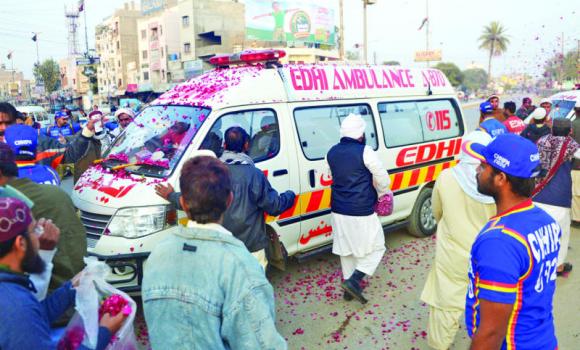
403
Sorry!!
Error! We're sorry, but the page you were looking for doesn't exist.
Pakistan hangs twofor sectarian murder
(MENAFN- Arab News) KARACHI: Pakistan hanged two sectarian militants on Tuesday for the murder of a Shiite doctor in Karachi officials said the latest executions since the government ended a moratorium on the death penalty.
Attaullah alias Qasim and Mohammad Azam were convicted of killing doctor Ali Raza in 2001 at the busy Soldier Bazaar area of Pakistan's largest city which is racked by rising sectarian violence.
A total of 22 people have now been executed since the government brought back hangings in terror cases amid public outrage over a Taleban massacre at a school that left 150 people dead.
'They were hanged at 6:30 this morning and their bodies have been handed to their relatives' a prison official said on condition of anonymity.
The convicts were both members of the banned militant outfit Lashkar-e-Jhangvi (LeJ) he added.
Unknown attackers detonated a low-powered bomb near two schools in Karachi Tuesday and left a note at the scene warning of more violence if the hanging of militants did not stop.
Pakistan has suffered a rising tide of sectarian violence in recent years most of it perpetrated by hard-line groups such as LeJ against Shiites who make up around 20 percent of the population.
The latest sectarian outrage was on Friday when a suicide bomber killed 61 people at a Shiite mosque in the southern Pakistani district of Shikarpur.
It was the deadliest attack targeting Shiites in Pakistan since February 2013 when 89 were killed in a market bombing in the southwestern city of Quetta.
Anti-Shiite attacks have been increasing in recent years in Karachi Quetta the northwestern area of Parachinar and the far northeastern town of Gilgit.
Around 1000 Shiites have been killed in the past two years in Pakistan with many of the attacks claimed by LeJ.
The country has stepped up its fight against militants since the Taleban school massacre in the northwestern city of Peshawar in December.
Heavily armed gunmen went from room to room at the army-run school gunning down 150 people most of them children in an attack that horrified the world.
In the aftermath the government ended a six-year moratorium on executions restoring them for terror-related cases and pledged to crack down on all militant groups.
The roads outside Karachi Central Prison were closed to traffic overnight as a security measure before the hangings.
Both the murderers were arrested in 2004 and tried in an Anti-Terrorism Court which handed down the death sentence.
The United Nations the European Union Amnesty International and Human Rights Watch have called on Pakistan to re-impose its moratorium on the death penalty.
Rights campaigners say Pakistan overuses its anti-terror laws and courts to prosecute ordinary crimes.
There are also concerns that death row convicts from cases not related to terrorism could be executed.
Attaullah alias Qasim and Mohammad Azam were convicted of killing doctor Ali Raza in 2001 at the busy Soldier Bazaar area of Pakistan's largest city which is racked by rising sectarian violence.
A total of 22 people have now been executed since the government brought back hangings in terror cases amid public outrage over a Taleban massacre at a school that left 150 people dead.
'They were hanged at 6:30 this morning and their bodies have been handed to their relatives' a prison official said on condition of anonymity.
The convicts were both members of the banned militant outfit Lashkar-e-Jhangvi (LeJ) he added.
Unknown attackers detonated a low-powered bomb near two schools in Karachi Tuesday and left a note at the scene warning of more violence if the hanging of militants did not stop.
Pakistan has suffered a rising tide of sectarian violence in recent years most of it perpetrated by hard-line groups such as LeJ against Shiites who make up around 20 percent of the population.
The latest sectarian outrage was on Friday when a suicide bomber killed 61 people at a Shiite mosque in the southern Pakistani district of Shikarpur.
It was the deadliest attack targeting Shiites in Pakistan since February 2013 when 89 were killed in a market bombing in the southwestern city of Quetta.
Anti-Shiite attacks have been increasing in recent years in Karachi Quetta the northwestern area of Parachinar and the far northeastern town of Gilgit.
Around 1000 Shiites have been killed in the past two years in Pakistan with many of the attacks claimed by LeJ.
The country has stepped up its fight against militants since the Taleban school massacre in the northwestern city of Peshawar in December.
Heavily armed gunmen went from room to room at the army-run school gunning down 150 people most of them children in an attack that horrified the world.
In the aftermath the government ended a six-year moratorium on executions restoring them for terror-related cases and pledged to crack down on all militant groups.
The roads outside Karachi Central Prison were closed to traffic overnight as a security measure before the hangings.
Both the murderers were arrested in 2004 and tried in an Anti-Terrorism Court which handed down the death sentence.
The United Nations the European Union Amnesty International and Human Rights Watch have called on Pakistan to re-impose its moratorium on the death penalty.
Rights campaigners say Pakistan overuses its anti-terror laws and courts to prosecute ordinary crimes.
There are also concerns that death row convicts from cases not related to terrorism could be executed.

Legal Disclaimer:
MENAFN provides the
information “as is” without warranty of any kind. We do not accept
any responsibility or liability for the accuracy, content, images,
videos, licenses, completeness, legality, or reliability of the information
contained in this article. If you have any complaints or copyright
issues related to this article, kindly contact the provider above.


















Comments
No comment